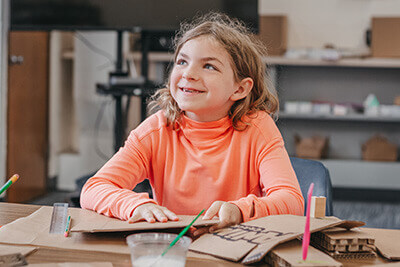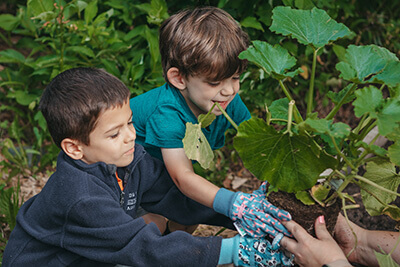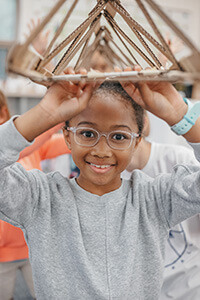June 26, 2025
 With the transition from school year to summer, families are presented with a unique chance to reimagine learning beyond the classroom. Summer has the potential for a joyful, enriching season where curiosity, creativity, and growth thrive together, whether it’s through imaginative play, new skills, outdoor exploration, or reflection. An intentional, balanced approach to summer can help children of all ages gain confidence, expand their skills and passions, and return to school feeling ready, refreshed, and inspired.
With the transition from school year to summer, families are presented with a unique chance to reimagine learning beyond the classroom. Summer has the potential for a joyful, enriching season where curiosity, creativity, and growth thrive together, whether it’s through imaginative play, new skills, outdoor exploration, or reflection. An intentional, balanced approach to summer can help children of all ages gain confidence, expand their skills and passions, and return to school feeling ready, refreshed, and inspired.
As parents navigate the summer season, many will ask: How do we make this summer count?
At Mounds Park Academy, we believe summer isn’t just a break, it’s a chance to grow in new ways. It’s still a season for joyful learning while adding outdoor exploration, and building key life skills that carry beyond the classroom. A well-balanced summer should focus on essential skills and goals for the child, blending movement, creativity, independent time, and meaningful experiences that bolster academic success during the school year.
Summer is the time that students can lean into their own interests, either by engaging in more choice reading, enrolling in a specialty sports camp, or taking out their sketchbook while lying under their favorite tree. The beauty of this time is that incorporating purposeful learning does not mean hours of worksheets and practice tests; it is experiential and a little bit more open-ended. Thoughtfully piecing together a summer that includes your child’s interests and needs while also pairing it with concrete goals is the first step to tailoring the perfect summer for your child and family.
A Balance of Movement and Creativity
Children thrive when physical activity is part of their daily rhythm, which is why during the school year, MPA’s Lower School students have physical education every day, and Middle School students have it every other day. During the summer, this could look like riding bikes, swimming, or simply running barefoot through the grass. Movement fuels the body and mind.
The American Academy of Pediatrics (AAP) notes that “recess and physical activity are crucial for the health, development, and well-being of children.” Summer is the perfect time to encourage children to head outside and take advantage of the extra time for physical and creative-based movement.
Mounds Park Academy offers some excellent camps where campers engage in activities that revolve around movement, coordination, and teamwork. Offerings span from tennis, volleyball, general physical education, and even pickleball. These can be paired with our Panther Club offerings, which can be either half or full days, where campers will explore creations with cardboard, STEM experiments, or papier mâché.
Summer offers a unique opportunity to pair physical play with rich learning. A morning of volleyball and an afternoon of making cardboard castles—that is a whole-child-focused summer.
 Skill development
Skill development
Kids are naturally curious, and summer is the perfect time to try something new while continuing to develop their academic and social skills. Another important type of skill that can flourish in the summer is transferable skills, such as problem-solving and creative thinking. Incorporating these skills together ensures a child is adaptable and can thrive in many different life arenas.
Dr. Deborah Gilboa, youth development expert, explains, “when kids try new activities in the summer, they become more adaptable, creative thinkers…and that carries into their school year.” The impact of these summer learning experiences can be seen in improved student achievement, attitudes, and skills, helping shape the child’s academic and personal success.
Mounds Park Academy’s summer programming is designed to inspire that adaptability, offering meaningful experiences that align with our school’s mission of joyful learning. We encourage incorporating academic skills, such as reading daily for 30 minutes to help build vocabulary and language development, or brushing up on multiplication flashcards, paired with new activities and enrichment. This also promotes balance and encourages flexibility within their activities.
Independent Time
While camps and structured programs offer enrichment, unstructured time at home is equally important. Pediatrician Dr. Michael Rich encourages families to embrace boredom as a pathway to creativity.
“When nothing is scheduled, kids are forced to turn inward, reflect, and create,” he says.
Encouraging independent play and creativity from an early age helps children develop foundational skills and a love for learning. A quiet afternoon spent building a LEGO city, reading in the grass, or dreaming up a backyard obstacle course is a simple moment that builds imagination, self-direction, and problem-solving. In a time when children are scheduled to the minute and a fear of boredom is at the forefront, let children embrace unscheduled time, become comfortable with it, and see what comes from unstructured, self-driven time.
Leadership and Lifelong Skills
Summer is also an ideal time to cultivate leadership. Whether helping a younger sibling, neighbor, leading a nature hike, or volunteering, students gain confidence, purpose, and empathy for others.
Angela Duckworth, psychologist and author of “Grit”, reminds us that “traits like perseverance, empathy, and initiative are more predictive of long-term success than someone’s IQ.”

When children are in a new environment, such as a summer camp, they are encouraged to be themselves. As school social cliques melt away, children are usually outside of their comfortable social circles in the summer, leading to an empowering and growth-filled opportunity.
Additionally, skills that can be done at home, such as setting and clearing the table, taking care of pets, or washing people’s cars, are some activities that encourage leadership and responsibility. To add critical thinking and further leadership, encourage your child to create a business idea, formulate what it would look like, and make flyers to market themselves, even if it is only to close friends and family. It could be as simple as a dog walking business or as complex as a brick-and-mortar store.
By encouraging independence, responsibility, and service, summer helps develop character and leadership that lasts a lifetime. It empowers children to realize the possibilities they hold and how capable they are in their own lives.
A Joy-Filled Summer of Learning
A joyful summer doesn’t need to be packed with back-to-back activities; it simply needs to be intentional. With the right blend of movement, variety, independence, leadership, and academic purpose, summer becomes more than a break; it becomes a bridge to a successful school year, and beyond.